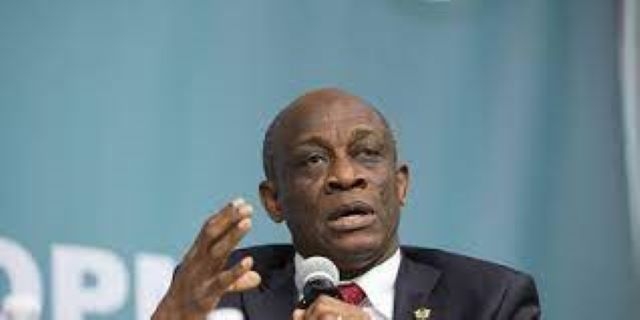Seth Terkper reveals Ghana's four tax regimes
 The former finace minister spoke in an interview after he delivered a presentation on Ghana's International Monetary Fund in Accra
The former finace minister spoke in an interview after he delivered a presentation on Ghana's International Monetary Fund in Accra
A former Finance Minister under former President John Dramani Mahama, Mr Seth Terkper, has revealed the complexities of Ghana's tax system and proposed reforms for a more efficient and transparent structure.
According to him, Ghana has four tax regimes namely: Income Tax, Excise Duty, Petroleum Tax and Import Duties.
He emphasised the importance of focusing on the four core taxes - income tax include: personal income tax, corporate income tax, and VAT, adding these are the pillars of the country's revenue regime due to their broad tax base.
He said petroleum tax are the levies put on products, adding that excise duties are punitive and usually put on products such alcohol and cigarettes, among others.
Mr Terpker raised concerns about the increasing number of levies, asserting that they contribute less than 6% to overall revenue and distort the primary tax system.
He called for transparency in the introduction of new taxes and urged a return to the core pillars for the tax regime.
The former finace minister spoke in an interview after he delivered a presentation on Ghana's International Monetary Fund in Accra on Wednesday Februay 28, 2024.
Furthermore, he questioned the delay in implementing digitalisation in the tax system, stressing the need for an efficient domestic Information Technology (IT) system for the Ghana Revenue Authority (GRA).
He suggested that improved tax collection mechanisms, such as automation and integration of income tax and VAT files, could result in increased revenue.
Mr Terkper also expressed reservations about certain levies, stating that they are distorting the tax regime and encouraging tax evasion and avoidance.
He recommended clearing unnecessary levies and focusing on the fundamental tax pillars for sustainable revenue generation.
In addition, Mr Terkper addressed the issue of returning to the capital market, emphasising the importance of success in the ongoing IMF programme and effective debt management policies.
He further called for a candid and realistic approach in negotiating with commercial creditors, stressing the need for a comprehensive debt management policy.
In conclusion, Mr Terkper advocated a holistic tax system reforms, emphasising transparency, efficiency, and the long-term financial health of Ghana.
Source: classfmonline.com/Cecil Mensah
Trending News

24-hour economy’ll ruin businesses like Abossey Okai; even God who created the world sleeps at night – Napo
12:26
VRA workers oppose proposed merger with Bui Power Authority
03:44
Recall of Parliament an ‘act in bad faith’ – Bagbin
17:20
Dec. 7 polls: Bawumia calls for peace, promises reforms on tour of Greater Accra
12:34
PNC postpones nat’l delegates congress again, sets new date for Sept. 7
22:53
Atta Kyea defends President Akuffo Addo on failed galamsey fight
10:07
Greater Accra NPP Chairman confident of winning nine additional seats
03:33
O'Reilly SHS student arrested for stabbing classmate to death
17:01
Grain smuggling does not warrant military deployment – Col Aboagye
15:37
Ghana signs milestone nuclear cooperation agreement with U.S. at US-Africa Summit
12:51




